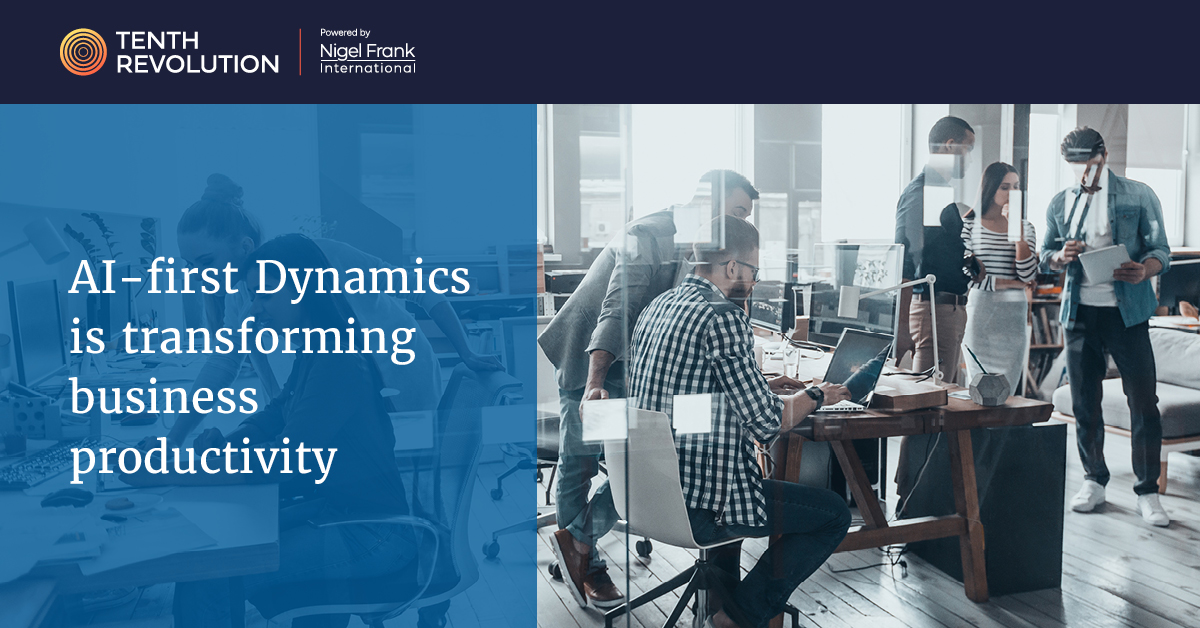
Microsoft is redefining enterprise productivity by embedding Copilot across Dynamics 365 and the Power Platform.
What started as a wave of early AI experiments within Dynamics has now matured into a full-scale transformation. Copilot has become a core feature across the Microsoft business ecosystem, moving from pilot projects to widespread production use. Organizations are now using it to streamline operations, improve customer experiences, and empower teams to work more efficiently.
For business leaders, this shift introduces a new phase of digital transformation, one driven by accessible, embedded AI that enhances everyday decision-making.
Dynamics enters the AI-first era
Microsoft has built Copilot directly into the applications that power daily operations. Within Dynamics 365 Sales, Customer Service, Finance, and Supply Chain Management, AI now supports the work employees already do, removing repetitive tasks and generating real-time insights.
Enterprises are adopting Copilot to:
- Create sales summaries, customer updates, and meeting recaps automatically.
- Recommend actions during live opportunities and customer interactions.
- Assist service agents in writing case responses and updating knowledge articles.
- Build financial forecasts and reports using natural language prompts.
- Deliver faster, data-driven decisions across multiple business units.
With Copilot Studio, organizations can design custom copilots grounded in Microsoft Dataverse. These tailored assistants can draw on internal data, follow governance rules, and reflect company-specific terminology and workflows. This helps enterprises build AI tools that are relevant, reliable, and secure.
From experimentation to enterprise value
Generative AI in Dynamics has moved far beyond testing environments. Today’s goal is operational reliability. Companies are scaling production-ready AI systems that support measurable business outcomes.
To achieve that level of maturity, leaders need both technical foundations and specialized talent. The technology itself is powerful, but success depends on the people who implement, manage, and optimize it. Key roles now emerging include:
- Dynamics AI solution architects who align Copilot features with business objectives.
- Data and Dataverse engineers who prepare, integrate, and secure organizational data.
- Change management and adoption leads who ensure that employees use AI effectively.
Hiring managers are realizing that adopting AI-first Dynamics solutions requires more than technical deployment. It calls for structured teams with strong collaboration between IT, operations, and leadership.
Nigel Frank connects enterprises with certified Microsoft professionals who understand how to build and scale AI-driven systems that deliver tangible business value.
The new Dynamics skill landscape
As Copilot becomes embedded throughout the Microsoft ecosystem, the skills required to manage Dynamics environments are changing rapidly. AI literacy, data governance, and automation strategy are now core competencies for Dynamics professionals.
Nigel Frank’s Careers and Hiring Guide 2025 highlights this shift, showing a growing demand for professionals with Power Platform, AI integration, and data security expertise.
Enterprises are beginning to rethink how they structure teams, combining business analysts, developers, and AI specialists into cross-functional groups. These teams can prototype, validate, and refine AI features faster while maintaining compliance and data quality.
Nigel Frank helps organizations hire the Dynamics and Power Platform talent that can manage this evolution, ensuring smooth integration of AI-first capabilities at scale.
Sustaining long-term AI adoption
AI transformation within Dynamics requires ongoing maintenance, governance, and continuous improvement. Data drift, model updates, and integration changes must all be managed carefully to maintain system accuracy and compliance.
Enterprises are approaching this by establishing:
- Centralized AI governance frameworks.
- Cross-departmental training programs focused on Copilot adoption.
- Clear accountability for data ownership and model performance.
- Regular review cycles to measure ROI and user adoption.
These operational foundations allow AI to deliver consistent business value rather than short-term novelty. They also create stronger collaboration between data, technology, and business teams essential for sustained innovation.
The next stage of Microsoft innovation
AI-first Dynamics environments are setting a new standard for productivity. Businesses that combine Copilot’s automation capabilities with skilled professionals will be positioned to move faster, make better decisions, and scale responsibly.




